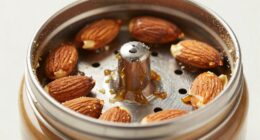I have always been intrigued by unique ingredients that can enhance my cooking and baking abilities. This curiosity led me to delve into the world of butter powder.
This remarkable culinary creation has been gaining popularity due to its convenience and versatility. In this article, we’ll explore the origin of butter powder, its benefits, how it’s made, and its key differences from regular butter.
So, if you’re ready to take your culinary adventures to the next level, let’s unravel the mysteries of butter powder together.
Key Takeaways
- Butter powder is a dehydrated form of butter that provides a longer shelf life and increased convenience.
- It is created through a process called spray drying, which removes moisture from melted butter.
- Butter powder is versatile and can be used in baking, sautéing, and seasoning dishes, adding a rich and creamy flavor.
- It has a significantly longer shelf life compared to regular butter and often has a lower fat content, making it a healthier alternative.
The Origin of Butter Powder
The origin of butter powder can be traced back to the early 20th century. It is a dehydrated form of butter that has been processed to remove moisture content, resulting in a powdered form that can be easily stored and transported.
This innovative method of preserving butter has its roots in the need for a longer shelf life and increased convenience. The historical significance of butter powder lies in its ability to provide a stable and long-lasting source of butter, especially during times when fresh butter was not readily available.
As advancements in technology and food processing techniques were made, butter powder became more widely produced and used in various culinary applications.
Transitioning into the next section about the benefits of using butter powder, it is important to note that this preservation method offers numerous advantages in terms of convenience, extended shelf life, and versatility in cooking and baking.
Benefits of Using Butter Powder
One advantage of using butter powder is that it can easily be stored for long periods of time. This makes it a convenient option for cooking applications and ensures that you always have butter on hand when you need it.
Here are four key benefits of using butter powder:
-
Convenience: Butter powder eliminates the need for refrigeration and has a long shelf life, making it a practical choice for camping trips or emergency food supplies.
-
Versatility: Butter powder can be used in a variety of cooking applications, such as baking, sautéing, and seasoning dishes, adding a rich and creamy flavor.
-
Health benefits: Butter powder contains essential fatty acids, vitamins A, D, and E, and is a good source of energy. It can be a healthier alternative to margarine or oils.
-
Portion control: Butter powder can be easily measured and allows for precise portion control, helping you manage your calorie intake.
Now that we have explored the benefits of using butter powder, let’s delve into how it is made.
How Is Butter Powder Made
If you’re curious about how to make it, you’ll be interested to know that butter powder is created through a process of removing the moisture from butter. This process is called spray drying, and it involves turning liquid butter into a fine powder.
The first step is to melt the butter and then separate the water content from the fat. This can be done by allowing the butter to sit and naturally separate or by using a centrifuge. Once the water is removed, the butter is then spray-dried, which involves spraying the melted butter into a hot chamber where the moisture evaporates, leaving behind the powdered butter.
This powder can be used in various recipes that call for butter, and it provides a convenient alternative to using traditional butter. However, if you’re looking for alternatives to butter powder, you can consider using margarine, oil, or even coconut oil as substitutes.
Cooking and Baking With Butter Powder
When it comes to cooking and baking, one of the advantages of using butter powder is its versatility in recipes. Whether you’re making cookies, cakes, or savory dishes, butter powder can be easily incorporated and provide the desired flavor and texture.
Additionally, butter powder has a long shelf life, making it a convenient pantry staple that can be stored for extended periods without losing its quality or taste.
Versatility in Recipes
Butter powder can be used in a variety of recipes to add a rich, creamy flavor. Its versatility in cooking makes it a valuable ingredient to have in the kitchen. Here are four reasons why using butter powder can be advantageous:
-
Convenience: Butter powder is easy to store and has a long shelf life, making it a convenient option for those who want to have butter on hand without worrying about it spoiling.
-
Easy to measure: Butter powder is pre-measured, eliminating the need for guesswork when adding it to recipes. This ensures consistent results every time.
-
Enhanced flavor: Butter powder enhances the flavor of dishes, giving them a delicious, buttery taste that is hard to replicate with other ingredients.
-
Versatility: Butter powder can be used in a wide range of recipes, including baked goods, sauces, and even popcorn. Its versatility allows for experimentation and creativity in the kitchen.
With its versatility and advantages, butter powder is a valuable addition to any cook’s pantry. Its long shelf life makes it a practical choice for those who enjoy cooking and baking.
Long Shelf Life
In addition to its versatility in recipes, butter powder also offers a long shelf life due to its preservation methods. This ensures that the product can be stored for an extended period without spoiling or losing its quality. The longevity of butter powder is achieved through a combination of dehydration and vacuum sealing techniques.
Dehydration involves removing the moisture from the butter, which inhibits the growth of bacteria and mold. Vacuum sealing, on the other hand, eliminates the presence of oxygen, which further prevents oxidation and spoilage. These preservation methods help maintain the flavor, texture, and nutritional value of butter powder over time.
To illustrate the benefits of these preservation methods, consider the following table:
| Preservation Method | Purpose |
|---|---|
| Dehydration | Removes moisture to prevent bacterial growth |
| Vacuum Sealing | Eliminates oxygen to prevent oxidation and spoilage |
Butter Powder Vs. Regular Butter: Key Differences
When comparing butter powder to regular butter, there are two key differences to consider: the shelf life and nutritional value.
Butter powder typically has a much longer shelf life than regular butter, making it a convenient option for long-term storage and emergency preparedness.
Additionally, butter powder often has a lower fat content and fewer calories compared to regular butter, making it a healthier alternative for those watching their diet.
Shelf Life Comparison
You’ll find that the shelf life of butter powder is significantly longer compared to regular butter. This is due to the removal of moisture during the manufacturing process, which helps to extend its longevity.
Here are four reasons why the extended shelf life of butter powder can be beneficial:
-
Convenience: Butter powder can be stored for months or even years, making it a convenient pantry staple. This means you’ll always have butter on hand, even if you run out of fresh butter.
-
Versatility: Butter powder can be used in a variety of recipes, from baking to cooking. Its long shelf life ensures that you can experiment with different dishes without worrying about the butter spoiling.
-
Travel-friendly: When going on camping trips or traveling, butter powder can be a great alternative to carrying regular butter. It is lightweight, easy to pack, and eliminates the risk of the butter melting or going bad.
-
Cost-effective: Since butter powder has a longer shelf life, you can buy it in bulk or during sales to save money in the long run. It eliminates the need for frequent trips to the grocery store for fresh butter.
When using butter powder as a substitute for regular butter, it is important to keep in mind a few cooking tips:
-
Rehydration: To use butter powder in recipes that require softened butter, rehydrate it by mixing it with an equal amount of water. This will bring back its creamy texture.
-
Adjusting for taste: Butter powder may have a slightly different flavor compared to fresh butter. Adjust the amount used in recipes according to your taste preferences.
-
Baking adjustments: When using butter powder in baking, you may need to make slight adjustments to the recipe, such as adding a bit more liquid or adjusting the baking time.
-
Storage: To maintain the quality of butter powder, store it in a cool, dry place away from direct sunlight. Ensure the container is tightly sealed to prevent moisture absorption.
Nutritional Value Comparison
To compare the nutritional value of regular butter and butter powder, you’ll want to consider factors such as fat content and vitamin content.
Butter powder is a convenient alternative to regular butter, especially for those who enjoy baking or cooking. It offers a longer shelf life and can be easily reconstituted with water.
However, when it comes to nutritional value, there are some differences to consider. While regular butter is higher in fat content, butter powder typically has a lower fat content due to the dehydration process.
In terms of vitamins, regular butter contains small amounts of vitamin A and vitamin D, while butter powder is often fortified with additional vitamins. It’s important to note that the nutritional value may vary between different brands and types of butter powder.
When incorporating butter powder into recipes, it’s essential to follow the instructions provided by the manufacturer to ensure proper reconstitution and taste.
Overall, butter powder can be a convenient option for adding a buttery flavor to dishes, but it’s important to consider the nutritional differences compared to regular butter.
Storing and Shelf Life of Butter Powder
Butter powder can be stored for an extended period of time without losing its quality. This makes it a convenient option for those who want to have butter on hand for various recipes.
Here are four key factors to consider when storing butter powder:
-
Vacuum-sealed packaging: This method removes oxygen from the package, preventing oxidation and maintaining the powder’s freshness.
-
Moisture-proof containers: To avoid clumping and moisture absorption, it is essential to store butter powder in airtight containers with moisture-absorbing packets.
-
Cool and dark storage: Butter powder should be stored in a cool, dry place away from direct sunlight to prevent degradation of its flavor and texture.
-
Regular quality checks: It is crucial to periodically check the quality of butter powder stored long-term to ensure it remains fresh and free from any off-flavors.
With proper storing methods and packaging options, butter powder can be safely kept for an extended period, ready to be used in a variety of recipes. Now, let’s explore some creative ways to incorporate butter powder into your favorite dishes.
Creative Ways to Use Butter Powder in Recipes
When using butter powder in recipes, it’s important to get creative and think of unique ways to incorporate its rich flavor into your dishes. Butter powder is a versatile ingredient that can enhance the taste of various dishes. Here are some creative uses for butter powder that can elevate your cooking:
| Dish | Creative Use | Flavor Enhancement |
|---|---|---|
| Baked Goods | Substitute part of the butter with butter powder in cakes, cookies, and pastries for a richer flavor and longer shelf life. | Adds a buttery taste without the need for refrigeration. |
| Popcorn | Sprinkle butter powder over freshly popped popcorn for a deliciously buttery and savory snack. | Provides a convenient and mess-free way to enjoy buttery popcorn flavor. |
| Mashed Potatoes | Mix butter powder into mashed potatoes for a creamy and flavorful side dish. | Adds a burst of buttery taste to your potatoes. |
| Sauces and Gravies | Incorporate butter powder into sauces and gravies for a rich and velvety texture. | Enhances the flavor and adds a creamy consistency. |
| Seasoning Blends | Blend butter powder with herbs and spices to create a savory seasoning mix for meats, vegetables, and pasta. | Infuses dishes with a buttery and flavorful kick. |
Frequently Asked Questions
Is Butter Powder Suitable for People With Lactose Intolerance or Dairy Allergies?
Butter powder is a versatile option for those with lactose intolerance or dairy allergies. It provides a lactose-free alternative to traditional butter and can be used in various recipes.
Can Butter Powder Be Used as a Substitute for Regular Butter in All Recipes?
Butter powder can be used as a substitute for regular butter in some recipes, but the taste and texture may not be the same. It is important to consider the specific recipe and desired outcome.
How Long Does Butter Powder Typically Last Once Opened?
Once opened, the shelf life of butter powder depends on proper storage. It typically lasts for several months if stored in an airtight container in a cool, dry place.
Does Butter Powder Contain Any Artificial Additives or Preservatives?
Butter powder typically contains artificial additives and preservatives. However, the benefits of using butter powder include convenience, longer shelf life, and easy storage. It can be a practical substitute for regular butter.
Are There Any Health Concerns or Risks Associated With Consuming Butter Powder Regularly?
Consuming butter powder regularly can have potential side effects on health. While it offers convenience and flavor, it’s important to be cautious. It’s best to consult a healthcare professional to understand the specific health benefits and risks associated with regular consumption.
Conclusion
In conclusion, butter powder is truly a modern marvel. Its origins as a convenient alternative to regular butter are fascinating, and the benefits it offers in terms of shelf life and ease of use are simply mind-blowing.
The meticulous process of creating butter powder is a testament to human innovation and ingenuity. Whether you’re a culinary master or just a casual cook, incorporating butter powder into your recipes will undoubtedly elevate your dishes to new heights.
So go ahead, embrace the powdered revolution and let your taste buds rejoice in the wonders of butter powder.









